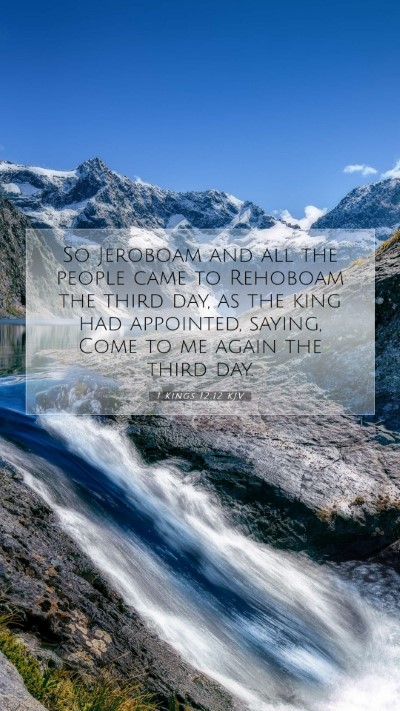Understanding 1 Kings 12:12
Bible Verse: 1 Kings 12:12 - "So Jeroboam and all the people came to Rehoboam the third day, as the king had appointed, saying, 'Come to me again the third day.'"
Overview
This verse marks a significant moment in the narrative of Israel's history, encapsulating themes of leadership, authority, and the tension between the old and new regimes. Rehoboam, king of Judah, faces a pivotal decision regarding the oppressive policies of his father, Solomon.
Commentary Insights
-
Matthew Henry:
Henry emphasizes Rehoboam's folly in not listening to wise counsel. He notes that the return of the people on the third day highlights their desire for a leader who would alleviate the heavy burdens imposed by Solomon.
-
Albert Barnes:
Barnes reflects on the significance of the three-day period, illustrating the importance of waiting for God's direction. The anticipation of the people mirrors their hope for relief and reform in governance.
-
Adam Clarke:
Clarke notes the historical context surrounding this verse, indicating how Rehoboam's decision would lead to the division of the kingdom. He suggests that this moment is crucial for understanding the shift in Israel's leadership dynamics.
Theological Significance
1 Kings 12:12 ultimately illustrates the delicate balance of power and the importance of wisdom in leadership decisions. Rehoboam's choice would profoundly impact the future of Israel, underscoring themes of governance and the accountability of leaders to their people.
Bible Study Insights
For those engaging with this scripture, it's essential to consider the implications of Rehoboam's leadership style and the people's reaction. This can serve as a rich topic for Bible study groups or online Bible study sessions.
Key Takeaways for Application
- Evaluate the responsibilities of leadership and the impact of decisions on community welfare.
- Reflect on how waiting for divine guidance can lead to more peaceful resolutions in personal conflicts.
- Consider the historical context and how it shapes our understanding of biblical narratives.
Cross References
- 1 Kings 12:1-3: The assembly of the people to discuss grievances.
- 2 Chronicles 10:3-4: Related account of Rehoboam's dealings with the people.
- 1 Kings 11:29-40: God's prophecy concerning Jeroboam's future and the division of the kingdom.
Conclusion
In summary, 1 Kings 12:12 serves as a critical juncture in biblical history, illustrating the complexities of leadership, the yearning for justice among the people, and the consequences of rash decisions. By studying this verse, we gain deeper Bible verse meanings and Bible verse interpretations, enriching our Bible study insights.
Further Study Considerations
For a more profound understanding, one might explore additional relevant literature on Biblical exegesis or participate in Bible study lessons focusing on themes of wisdom and governance.


